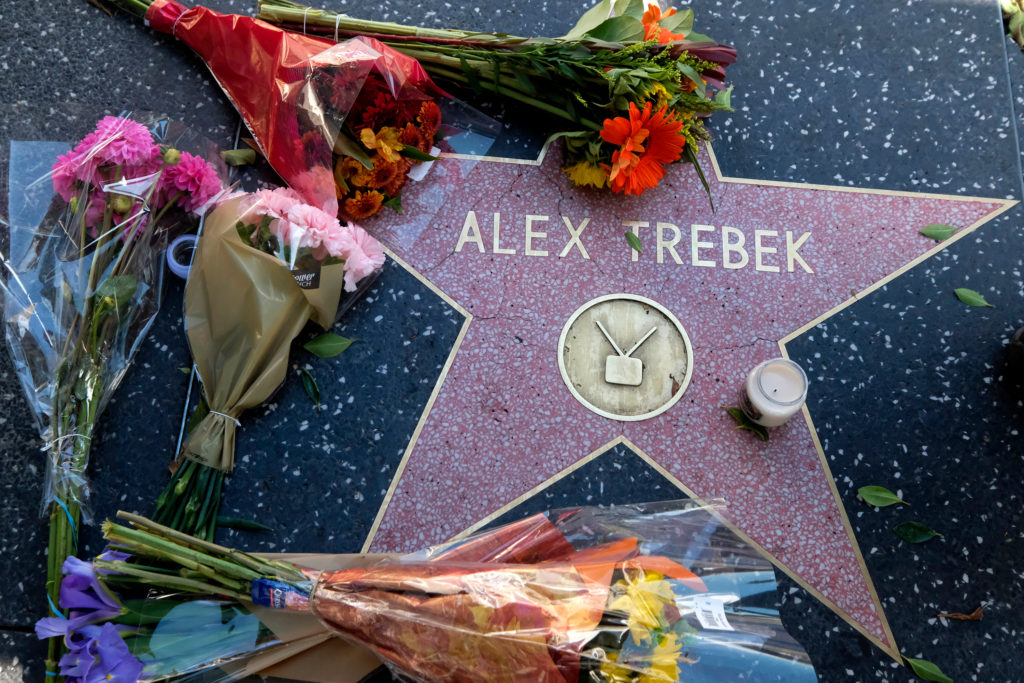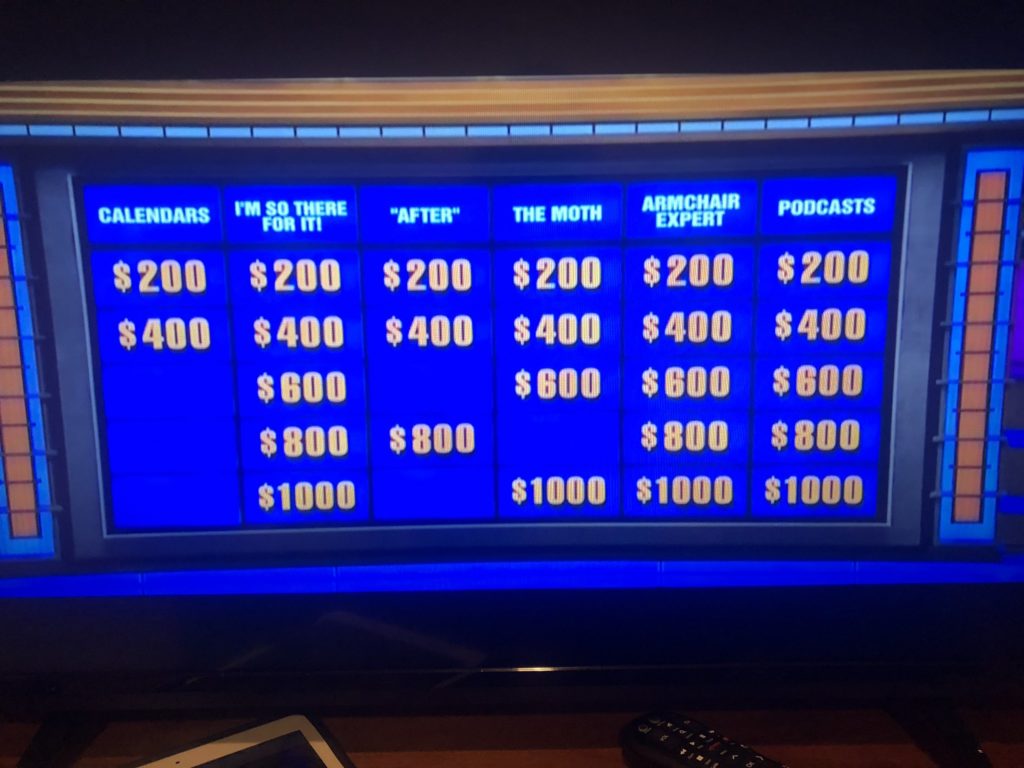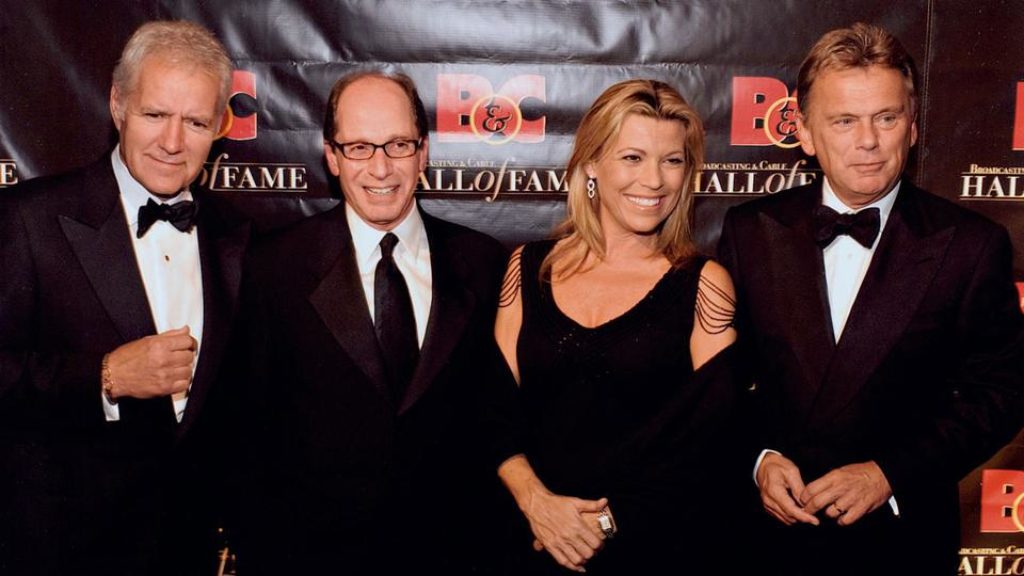
There is so much happening in our world right now that it is easy to overlook – or just miss altogether – some of the human stories that inspire us.
One of them is taking place tonight. And it’s more than a story – it’s a marvelous saga that has endured for 37 years.
The last episode of Jeopardy! hosted by Alex Trebek airs tonight, ending an amazing run. (By Trebek’s choice, he was the show’s “host” – not its “star.”)
Now, some of you may be saying, “Wait – didn’t Trebek die last November?”
And you would be right. The producers of the show and Trebek himself planned for this moment, focused on their long-time routine of taping new episodes two months in advance.
According to LifeHacker, the last “original” show hosted by Trebek was originally set to air Christmas Day. But apparently, scheduling preemptions scuttled that plan. Instead, Jeopardy! went into reruns on December 21 through January 1. The last of these “new” episodes with Trebek airs tonight.
A lot of careful planning went into this aloha moment for Trebek, stricken with stage 4 pancreatic cancer back in 2019. As sad as that diagnosis was for all involved – especially the venerable host – it gave the Jeopardy! team a window in which to plan for the inevitable end.
And plan they did.
Aside from smart, strategic scheduling (which we can assume led to record-setting ad rates for these final shows), Jeopardy Productions was able to reap the benefits of Trebek’s presence a full three months to the day after the host passed away.
Perhaps these are unusual circumstances – a host, an executive producer, and a production team all on the same page. In contrast, so many radio stories featuring heritage talent don’t have happy endings.
Most often than not, these departures – voluntary retirements and terminations – aren’t especially well-planned – or planned at all. Aside from the obvious lack of financial benefits of clumsily saying good-bye, a beloved host could participate in a great “victory lap.” In too many cases, however, it’s the loyal audience often ending up getting dazed and confused.
In fact, too often, hardcore fans end up at best puzzled, and at worst, disillusioned with management or ownership about how such a departure could happen. Consequently, “urban legend” stories pop up like weeds as a result of a poor communications strategy. Most of these stories involve rumors and even conspiracy theories, almost all of which are inaccurate or downright false.
The story in LifeHacker was written by Dr. Elizabeth Yuko, a bioethicist and adjunct professor of ethics at Fordham University. Its title – “How to Watch the Last New Episodes of ‘Jeopardy!’ Hosted by Alex Trebek” – is something that radio programmers, managers, and owners would love to read about the loss of one of their heritage personalities. It is a fan-centric story that honors the host, the show, and the audience. But as most of us know from our experiences in radio, it doesn’t usually work out that way.
 Dr. Yuko’s story lists several activities Jeopardy! fans might participate in to commemorate Trebek’s historic run, including playing a game online with family or friends or becoming involved with The Compassion Project, an education initiative supported by Alex and Jean Trebek. She also provides links for watching Trebek cameos on other TV shows, as well as a site that archives old episodes.
Dr. Yuko’s story lists several activities Jeopardy! fans might participate in to commemorate Trebek’s historic run, including playing a game online with family or friends or becoming involved with The Compassion Project, an education initiative supported by Alex and Jean Trebek. She also provides links for watching Trebek cameos on other TV shows, as well as a site that archives old episodes.
Sadly for fans, it seldom works this way in radio. Management often tries to protect the brand, denying departing personalities a final week’s worth of shows – or even a “last show” at all. The thinking is that with an open mic, much damage can be done.
But it is often a lost opportunity when a morning host or night jock “disappears” from the station with no explanation – or worse, a company statement full of legalese so obviously stilted and contrived that it provides no solace for anyone involved. If anything, it just pisses people off.
As a programmer, I never had to administer over a high profile talent departure. But as a consultant, I’ve been in the room where it happens many, many times. Sometimes I have the opportunity to affect the course of the decision; many other times, the call has already been made, and it’s usually more about cleaning up the mess that inevitably happens when a popular personality is unartfully jettisoned from the building.
At the end of the day, it should be about the fans. But typically, they’re the least represented. If we were able to put on our X-ray glasses, and look behind the scenes at Jeopardy Productions these past 20-odd months, we’d likely see executive producer Harry Friedman and his team – along with Trebek himself – planning and plotting these last weeks….and even the last days of the host’s presence on the show.

Three years ago last month, I was fortunate to attend a special dinner at the NAB in Las Vegas honoring Friedman for his decades with both Jeopardy! and Wheel of Fortune. Trebek, along with Pat Sajak and Vanna White, was in attendance, each honoring the talented executive behind their shows.
The dinner took place at the Wynn, and we were staying at the Encore. During the post-dinner stroll, I found myself walking next to Trebek and his wife.
Trebek overheard my conversation about the award ceremony, and we started a friendly back-and-forth trivia exchange about Tiny Tim (of all people). As you would expect, he was engaged, witty, devilishly funny, and marvelously playing the part of Alex Trebek, who I suspect was the same guy on and off the set.
 I have long been a believer in “the empty chair” philosophy, whether you work in content, sales/marketing, or management. That means including fans in every meeting at the station with a symbolic unoccupied seat representing the audience.
I have long been a believer in “the empty chair” philosophy, whether you work in content, sales/marketing, or management. That means including fans in every meeting at the station with a symbolic unoccupied seat representing the audience.
As the discussions roil on – and the “should we,” “would we,” “could we” debates rage on – looking over at the chair reserved for a fan of the station and the show makes a difference in the decisions ultimately made as well as the way they are implemented.
When you respect the fans, it helps guide those tough, often squirmy calls that have to be made. And when it comes to escorting heritage talent out the door – whoever’s decision it was and however the call was made – there’s often a way to handle it that benefits all involved that is smart, thoughtful, and yes, even profitable.
The next big decision for Harry Friedman and Jeopardy! is who will be the next host of the show. (Note I didn’t say “Who will replace Alex Trebek?”). Because he and his team will no doubt be consulting the “empty chair” in their strategy room, they’ll inevitably make a good call.
Stay tuned.
(And isn’t that the point?)
Thanks to Dave Beasing for the topic, the angle, and the wisdom.
- What Is It With Female Robot DJs? - April 30, 2025
- Why “Dance With Those Who Brung You” Should Be Radio’s Operating Philosophy In 2025 - April 29, 2025
- The Exponential Value of Nurturing Radio Superfans - April 28, 2025




Timely and perspicacious post, Fred. I invite you also to ponder a similar departure: when a station abruptly changes its format. Maybe abruptness is unavoidable in this circumstance, but it still can be managed well–or badly. How can the fans of the old format not be unhappy?
I remember back in the ’90s when legendary jazz station KJAZ (Alameda CA) switched at midnight to a Spanish-language format, necessarily turfing out the entire crew, because the station had been sold. Everyone knew it was coming well in advance. But the station staff came together and all the talent participated in a final three-hour signoff shift, where they shared experiences, played great jazz, and bid a heartfelt adieu to the listeners. There was minimal bitterness (expressed), and we listeners were left with an aftertaste nowhere near so bitter as it might have been. (I captured this “end of an era” on a couple of audio cassettes!) Such sweet sorrow…
John, you are right about the listener/station relationship. In some ways, it is as “righteous” as those that fans have with talent. I saw this up close and personal with The Sound in LA, purchased by EMF a few years ago. The station had some breathing room to say goodbye to fans, advertisers, and friends. The fact aa fan listener group still meets regularly online is a testament to doing these signoffs the right way.
Great piece Fred. Unfortunately, I have had to deal with several high profile departures and they’re never fun. But I have always believed, that barring a contentious situation that would necessitate an immediate split, it’s always better to let the host have a final show or shows, especially if the host has longstanding market equity. It’s rewarding for the audience, for the clients, and for the partners of the station, and while the host may not feel that way initially, I believe it’s a positive experience for them as well. As a Jeopardy fan growing up, I had so much fun watching the show. Alex Trebek was so unique, so compelling and so personable. He was as good a talent/host as there’ll ever be in this setting. To be able to watch his final shows over these last few months have been very meaningful and an incredible tribute to his talent and legacy.
Jason, thanks for this. It may be “safer” to simply sever these relationships, but it is ultimately not good for most involved. And let’s not forget those still on the staff, paying close attention to how these things end. It is easy to be charming, hospitable, and generous on the front end; much harder when the clock has run out. Thanks, Jason.
Nailed it. Fans (listeners) first. Without them, there is nothing. All station jobs do not matter without them. If more decisions were made with that in mind, perhaps we would have less jaded listeners and go back to being that ever present “friend” that drew us into this career in the first place.
Kurt, I agree. Companies like Spotify, Apple, and SiriusXM have essentially no personal contact with fans (or should we call them “users?”). But in local radio, in particular, that eye contact should be an asset, not a deficit. Respecting that relationship is an important of the programming and management process. Respecting the audience – fans first – is a strength when acted upon honestly.
Just a beautiful tribute to one of the great media icons of our times. I got a chance to “hang up my phones” last year in a way that, well, I think you’ll find almost unbelievable. I lived it and I can’t believe it. It was truly the most perfect capping off of what was the most amazingly rewarding life in radio that I could have imagined–all with management’s blessing. A little too long to go into here but I hope I get the chance to share it with you sometime. I’m sure you’ve never heard anything like it. I know I haven’t. But I think you’ll love hearing it.
Thanks for the great read. Like everyone else, I’ll be tuned in tonight.
Dave, I’d love to hear the story – they are too few & far between. I’m thrilled you had a memorable & positive good-bye.
In terms of announcing the upcoming retirement of a legendary host, I think WCCO nailed it earlier in the week: https://www.radio.com/wccoradio/news/local/the-end-of-an-era-dave-lee-announces-his-retirement.
Separately, it’s helpful to understand just how unusual (or even unique) the current situation with Jeopardy! is–and not just in terms of Mr. Trebek’s longevity with the show: Until the early ’80s, syndicated TV shows still depended on “bicycling” physical tapes among individual stations–resulting in, at the very least, different airdates in different markets. This came back to haunt the syndicated revival of What’s My Line? (1968-75) twice: first with Bennett Cerf, who was still serving as an occasional panelist when he died in 1971; and then with Larry Blyden, who was the host for the last few years, but who died before all of the remaining episodes aired in all of the markets. This contrasts with the original network version (1950-67), which was able to quickly pull off tributes for both Fred Allen (1956) and Dorothy Kilgallen (1965).
Still, there have been a lot of well-handled finales for game shows (especially network ones) over the years–and this includes some examples where there was just a new host, or where the show was just changing networks. One example, though, of a game show that didn’t have its goodbye happen as planned was the ’70s CBS version of Match Game; it managed to tape a farewell episode, only to then see the network make its daytime-schedule changes a few weeks early.
Eric, this is great stuff, and I appreciate you sharing it with us. I was not aware of the “Match Game” story. Dating myself (so what else is new?), I’m assuming we’re talking about the Gene Rayburn era? Meanwhile, now thanks to you, I’ve got the theme song as today’s “ear worm!”
Yes, it was during Mr. Rayburn’s reign. However, he actually hosted all of the versions through the mid-’80s: the original, straightforward version (1962-69); the “golden era” versions (1973-82); and the MG portion of the combined Match Game/Hollywood Squares Hour (1983-84). There were attempts to have him host another revival–although they never got off the ground, and he unfortunately might’ve been seen by then as being too old.
Also, doing a bit more research, I’m not as sure now that there was indeed a specific farewell episode that was taped for the CBS run; however, at the very least, the network did skip over many of the final episodes (including, in their entirety, the last couple of taped weeks). That might be especially ironic in that one of the hallmarks of that run–since it was officially called Match Game 73 through Match Game 79, in order to differentiate it from the ’60s version–was the consistent use of New Year’s changeover episodes. Just in case, here’s the final example (where Match Game 78 officially became Match Game 79): https://www.youtube.com/watch?v=irJ8YgZnivw.
Wow, what a trip back in time. Seeing Jack Jones, Connie Stevens, and probably one of the few survivors – Betty White. But what grabbed my attention was the microphone technology – Gene Rayburn’s mic was like a pointer. And now the damn theme song is embedded in my head. Appreciate you taking me down the rabbit hole!